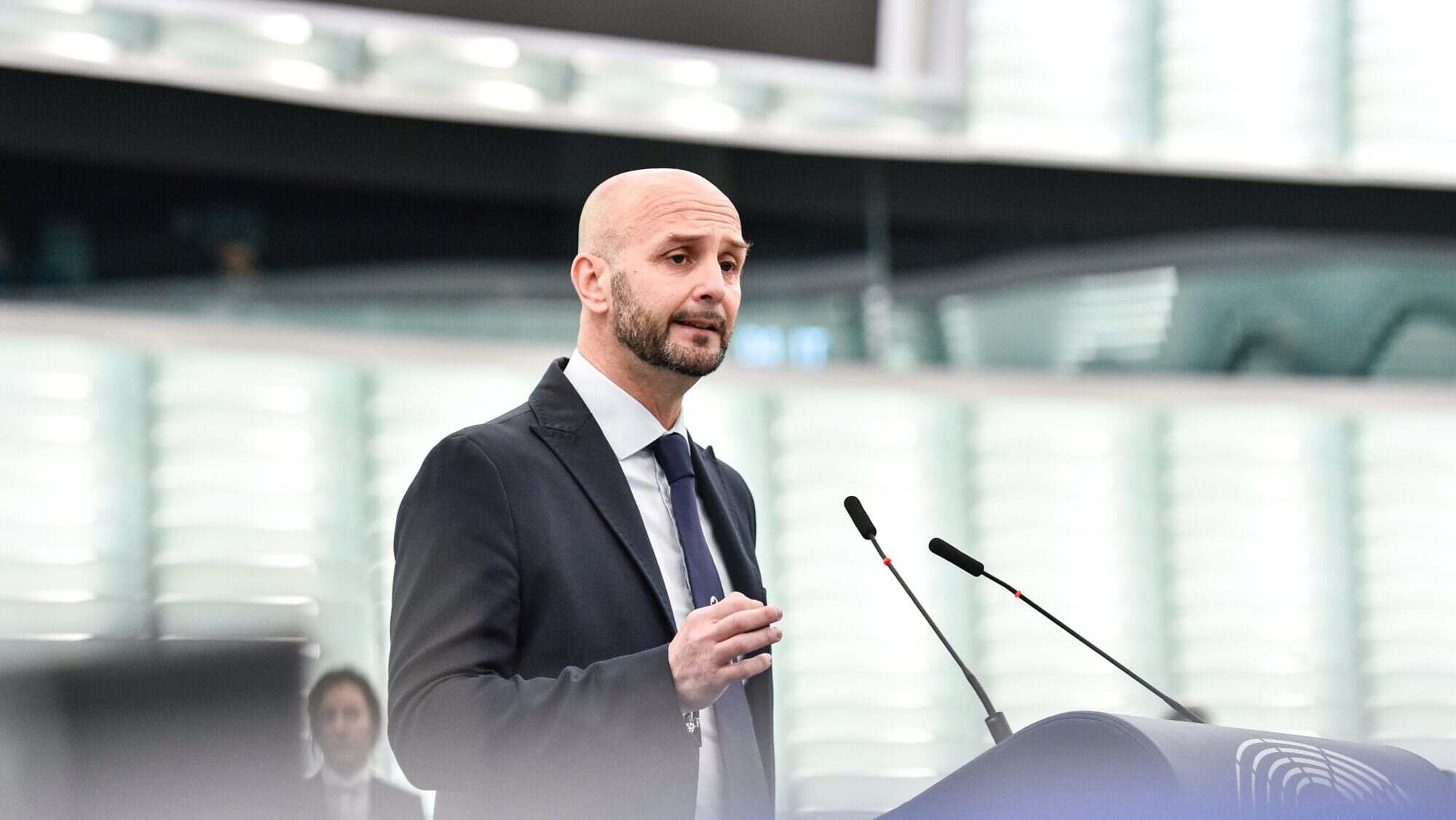
ECR Co-President Nicola Procaccini
Photo: Eric Vidal © European Union 2024 – Source : EP
Admitting the Romanian AUR party to Giorgia Meloni’s ‘center-right’ ECR group in Brussels was “mainly just for the numbers,” the group’s co-president, Nicola Procaccini, said during a press conference on Thursday, June 20th. He added that there are no longer concerns about AUR after it pledged to subscribe to ECR’s values.
The press conference was held a day after it was announced that the controversial Romanian delegation would sit within the European Conservatives and Reformists (ECR) in the European Parliament, helping the group to overtake the liberal Renew as the third largest bloc in Brussels.
According to Procaccini, boosting the numbers was the main motivation behind admitting AUR (Alliance for the Union of Romanians) and not necessarily a pre-existing ideological alignment. Furthermore, ECR made sure that AUR will follow the same principles that guide the group as a whole.
“We asked AUR for a formal, written declaration in support of the Ukrainian cause,” Procaccini said when a journalist brought up AUR’s troubling anti-Ukrainian statements and well-known pro-Russian rhetoric.
For instance, a former AUR senator submitted a bill aiming to annex five Ukrainian territories last year. Meanwhile, the party leader, George Simion, is banned from entering both Ukraine and Moldova for his inflammatory statements and Kyiv-alleged ties to Russian intelligence services.
AUR party calls for Romania to annex four Ukrainian teritorries
— Costin Andries (@CostinAndriess) January 27, 2024
Claudiu Târziu, one of the leaders of Romanian party AUR, calls on Romania the annex four areas of Ukraine: Northen Bukovina, Southern Bessarabia, Hertsa region and Transcarpathia.
The call was made in a speech held… pic.twitter.com/ZbPpNO9T5e
ECR was ready to forget all that in exchange for a signature.
“Without that [declaration] entry into ECR would not have been possible, because we have always been alongside Kyiv,” he explained, adding that the same would be required of the Hungarian ruling party, Fidesz, were it also to want to join. “If tomorrow, [PM] Orbán wants to join the ECR, he should do the same,” Procaccini said.
The co-president also explained that Fidesz has not formally applied, so there are no further talks at the moment. It is now unlikely that the Hungarian side will want any further talks, as Fidesz immediately reacted to AUR’s admission by saying it would never share a faction with such a party, “known for its extreme anti-Hungarian stance,” referring to AUR’s campaigning against the country’s one-million strong ethnic Hungarian community.
🛑Fidesz Parliamentary Group Leader Máté Kocsis: "The Romanian AUR party, known for its extreme anti-Hungarian stance, has joined the @ECRgroup in the European Parliament. Fidesz will never share a faction with such a party in the European Parliament. This is non-negotiable!" pic.twitter.com/Ym6u9hd8H2
— Zoltan Kovacs (@zoltanspox) June 19, 2024
When asked about AUR’s frequent antisemitic scandals in the past—like relativizing the Holocaust, trying to erase it from the school curriculum, and glorifying WWII-era fascist leaders as “heroes” and “martyrs”—Procaccini said the party had changed.
Nothing proves that better, he claimed, than the fact that ECR has received word from Likud, Israel’s governing party, and even from representatives of the Jewish community in Romania, congratulating and endorsing the AUR’s admission into the group.
It’s true that Likud has begun to reconcile with AUR after initially rejecting its outreach two years ago. Last year, Simion sat down with Israel’s ambassador to Bucharest to publicly “recognize” Romania’s responsibility in the Holocaust and express his regrets, although the meeting sparked harsh criticism from the government back home.
Whether Likud endorsed AUR joining ECR, as Procaccini claimed, cannot be independently verified.
Procaccini being forced to defend AUR is somewhat ironic, given the original context of the press conference, which was, among others, organized to address claims from an MEP of the social democrat S&D group, Iratxe García, who said on X a few days ago that she spotted the ECR chief giving the “fascist salute” in a documentary about the Italian governing party, Fratelli d’Italia.
We are shocked by the documentary realized by the online platform Fanpage reporting about the close ties between Meloni's party and fascist nostalgia.
— Iratxe García Pérez /❤️ (@IratxeGarper) June 14, 2024
Among several outrageous videos, a picture is clearly showing ECR co-chair Procaccini doing the so-called "fascist salute".…
According to Procaccini, it was actually another person next to him who initiated the movement by grabbing his arm and raising it in the blurry footage. For her “colossal lie,” he is reporting García for the crime of “aggravated defamation.” Besides, there is a difference between a “Roman salute” and a fascist hand gesture, he added.
“What’s the difference? Wasn’t the fascist salute inspired by the Roman?” a journalist inserted, to which Procaccini replied simply, “I don’t know.”
. @IratxeGarper , S&D Group President, in her official profile on X claims that there is an image of me on TV doing the 'fascist salute'. This is a colossal lie, gratuitous and violent. So much so that Perez is careful not to show this image. I will sue the socialist president…
— Nicola Procaccini (@NProcaccini) June 14, 2024
